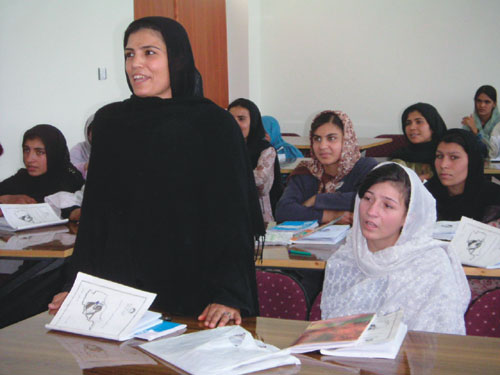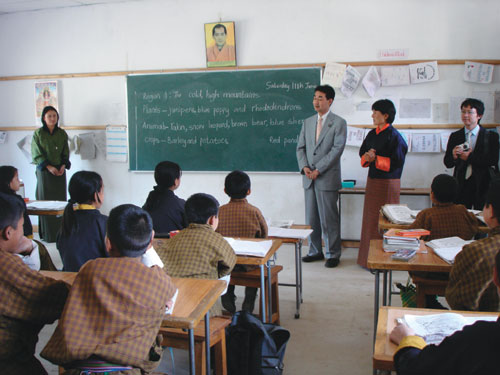Japan's Official Development Assistance White Paper 2005
Main Text > Part II ODA DISBURSEMENTS IN FISCAL YEAR 2004 > Chapter 2 Details and New Policies about Japan's ODA:Striving for Further ODA Reforms > Section 2. Measures for Each of the Priority Issues > 1. Poverty Reduction > (1) Education
(1) Education
More than 103 million children in the world are out of school. Moreover, approximately 800 million adults are illiterate, of whom, two-thirds (64%) are women.
Education plays an important role in socio-economic development. Education also allows each individual to fully develop his or her talents and capabilities in order to live with dignity. It can also serve as the foundation for cross-cultural coexistence and global peace. Especially in the field of basic education, the international community has been strengthening its efforts to make progress including achieving universal primary education by 2015, a goal which was established in "Education for All ( EFA ) - Dakar Framework for Action" *1 and in the MDGs.
Japan announced in 2002 that it would provide over ¥250 billion in ODA in the area of education to low-income countries over the following five years. By the end of FY2003, it provided approximately ¥105.1 billion through grant aid, technical cooperation, and trust funds set up at international organizations such as the United Nations Educational Scientific and Cultural Organization ( UNESCO ) and the United Nations Children's Fund ( UNICEF ). Japan also launched the Basic Education for Growth Initiative ( BEGIN ) in 2002. The priority areas of Japan's assistance under the framework of BEGIN are: (1) ensuring "access" to education; (2) improving "quality" of education, and (3) improving "management" of education. It upholds such new endeavors as the provision of educational assistance during post-conflict nation-building to support the efforts to achieve "education of all" in developing countries.
As part of its efforts to "ensuring access," Japan is making major contributions by constructing school facilities to help resolve the issue of insufficient number of classrooms and to improve the learning environment, through such measures as providing separate toilets for girls and boys in order to promote female attendance. Not only lack of schools, but also the low levels of understanding and awareness of education among parents and local residents contributed to low school enrollment rates in developing countries. In Niger, which has lower enrollment ratio in primary education in the world and has been endorsed as one of the recipient countries of the Fast Track Initiative ( FTI ), *2 Japan provides assistance to improve awareness of parents and community residents, and promotes their participation in school management. Specifically, Japan is providing training for principals, teachers, students' guardians and local residents, who make up the school governing board, as well as capacity-building training for regional education administrators. Such efforts are expected not only to expand the access to education, but also improve the management and quality of education. Moreover, the training manual developed under the Japanese project was used as a basis for formulating the Niger government's official manual. In such ways, Japan has been contributing to the formulation of Niger's educational policy.
Such assistance, to improve education involving two interdependent factors of local residents' participation in school management and capacity-building of regional educational administration that are to continually support the school management, is also being carried out in Ethiopia and Indonesia.
Chart 13. Basic Education in the World (number of out-of-school children and adult literacy rate)

Furthermore, to realize "Education for All" access to education must also be provided to illiterates, which account for 18% of the world's adult population. In Afghanistan, where the adult literacy rate is at the lowest standard in the world due to the breakdown of the education system caused by prolonged conflicts, Japan has been providing assistance for dissemination of literacy education via community learning centers based on the idea of old Japanese "Terakoya (temple hut)," the civilian-run schools, in cooperation with National Federation of UNESCO Associations in Japan. This project is also in concert with literacy teaching materials development, which is conducted through the Japanese Funds-in-Trust for the Capacity-Building of Human Resources *1 established in UNESCO. Such non-formal education that targets those who have not received formal education in schools is effective in providing necessary education to illiterates.
In addition to providing access to education, many developing countries also face the challenge of improving the "quality" of education. Because the quality of education highly depends on the quality of teachers, it is important to enhance and systematize teacher training programs, including those for new and in-service teachers. Japan is providing assistance in developing practical training models for in-service teachers, mainly in the areas of science and math, which are necessary for acquisition of basic academic skills and technological advancement. Such assistance is currently extended in Honduras, Egypt, Kenya, South Africa, Indonesia, Ghana, the Philippines, Cambodia, and Bangladesh, among others.

Women in Afghanistan receiving non-formal education. Women were not allowed to receive education under the Taliban regime (Strengthening of Non-formal Education Project) (Photo: JICA / National Federation of UNESCO Associations in Japan)
In Sub-Sahara Africa, the Strengthening of Mathematics and Science in Secondary Education ( SMASSE ) project was launched in Kenya in 1998. To share the knowledge and experience gained through this project, a regional partnership network was established extending beyond Kenya's borders. It has been highly regarded by regional development agencies, as it has also begun cooperation with New Partnership for Africa's Development ( NEPAD ) and Association for Development of Education in Africa ( ADEA ). *1 It is hoped that the campaign to reform math and science classes will spread to neighboring African countries. ( See 1 of Part I, Chapter 2, Section 3 for science and math education projects.)
Education not only provides a foundation for post-conflict reconstruction, but also plays a facilitating role in promoting mutual understanding, serving as cornerstone for peace, and protecting children from various dangers. Japan has been extending assistance in post-conflict education rehabilitation efforts in cooperation with international organizations and NGOs. In cooperation with UNICEF it supported the "Back to School Campaign" in post-conflict Afghanistan, and later provided reconstruction assistance in Iraq for primary and middle school education totaling over US$40 million. Under the Iraq Primary and Secondary School Enhancement Plan through UNICEF, which has begun in May 2004, reconstruction of 150 primary and secondary schools and provision of learning materials and school supplies to approximately 5.4 million children and 260,000 teachers are underway.
In order to strengthen the domestic institutions for education-related cooperation, the "Cooperation Bases System" *2 was launched in April 2003. With Hiroshima University and University of Tsukuba playing central roles, efforts including "Sharing Cooperation Experience" in the area of education and enhancement of support for in-service teachers are being carried out. Furthermore, under the Japan Overseas Cooperation Volunteers ( JOCV ) "Special In-Service Teacher Participation Scheme," 12 which was established in FY2001, a total of 266 in-service teachers have been dispatched over four years and are actively working in many parts of the world.
Chart 14. Major Examples of Japan's Support in the Basic Education Sector


Parliamentary Secretary for Foreign Affairs Kawai visiting Rinchen Kuenphel Lower Secondary School in Bhutan
As part of the Cooperation Bases System project, Japan's Ministry of Education, Culture, Sports, Science, and Education ( MEXT ) and Ministry of Foreign Affairs ( MOFA ) have been co-hosting the Japan Education Forum ( JEF ) since FY2003. At the JEF II in February 2005, Minister of Education of the Republic of South Africa, State Minister for Primary and Secondary Education of the Republic of Rwanda, and Director of UNESCO's Division of Basic Education were invited to exchange opinions from the viewpoint of developing countries regarding the modalities of effective education for girls.
In addition, United Nations Decade of Education for Sustainable Development ( UNDESD ), which was proposed by Japan at the 2002 World Summit on Sustainable Development ( WSSD ) and was adopted by the UN General Assembly in the same year, began in January 2005.
Japan assisted UNESCO, which is the lead agency for the promotion of UNDESD, in the formulation of the International Implementation Scheme by offering US$100,000 in March 2004. Japan also set up "Education for Sustainable Development Trust Fund" in FY2005 to assist UNESCO's efforts, including community and school-based activities and the development of teaching materials related to education for sustainable development. Moreover, efforts to promote education are being carried out through various occasions such as Prime Mover Project in the Asia Cooperation Dialogue of Japan/ Environmental Education, which was held in June 2004 in Tokyo.


 Next Page
Next Page